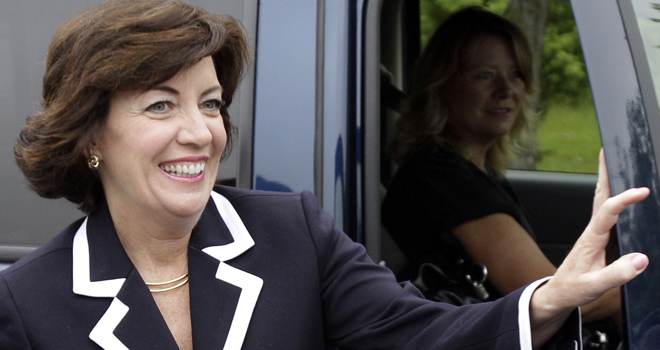National Democrats were united in their post-election message after their NY-26 win, issuing a flurry of statements claiming the race as a victory over Paul Ryan’s Medicare plan.
Supporters chanted “Medicare” at Democrat Kathy Hocul’s victory party, and she made it a centerpiece of her speech.
“We can ensure we do not decimate Medicare,” Hochul said. “We will keep the promises made to our seniors who have spent their lives paying into Medicare, so they can count on health care when they need it most.”
If Democrats have their way, there will be a lot more speeches along those lines come November 2012. The chairs of both legislative election committees made clear on Tuesday that they believe they have found a winning formula they intend to use elsewhere.
“The election last night showed that Democrats have the keys to drive the budget debate and play offense in 2012,” Sen. Patty Murray (D-WA), chair of the Democratic Senatorial Campaign Committee, said in a statement. “The implications of this election extend to Senate races in battleground states and red states across the country. The results provide clear evidence that Democratic senators and senate candidates will be able to play offense across the country by remaining focused on the Republican effort to end Medicare and force seniors to pay thousands more for health care costs.”
Rep. Steve Israel (D-NY), chair of the Democratic Congressional Campaign Committee, said that the party had “served notice to the Republicans” that the Medicare issue could hurt them.
“Even in one of the most Republican districts, seniors and independent voters rejected the Republican plan to end Medicare,” he said. “The American people will continue to hold House Republicans accountable for their plan to end Medicare from now until election day 2012.”
For Rob Zerban, a Democrat running against GOP budget guru Rep. Paul Ryan (R-WI) in 2012, the Hochul race was an instructive boost to his campaign hopes.
“I just am overwhelmed at the results from this election. It’s a harbinger of things to come,” he told TPM over the phone on Tuesday night. “I’m certainly going to make this a key issue in the 1st Congressional District in Wisconsin. … Democrats are going to focus on how we can actualy shore up, strengthen, and keep Medicare solvent, and this will be a clear distinction in the 2012 cycle.”
National Republicans were muted in their reactions to the race, but several cited the presence of an independent Tea Party candidate, Jack Davis, as evidence that the race was more exceptional than it appeared. Many cautioned that special elections — an area where Republicans have a dismal track record in general — are by no means predictive of the general election.
“Obviously, each side would rather win a special election than lose, but to predict the future based on the results of this unusual race is naive and risky,” Rep. Pete Sessions (R-TX), chair of the National Republican Congressional Committee, said in a statement.
But the strength of Hocul’s support on election night, which compared favorably with Democratic wave years like 2006, led others to present a more stark picture. Conservative SuperPAC American Crossroads, while not conceding the cause of the NY-26 lost, warned its supporters that it was clear evidence 2012 would be a much tougher year for the right than the 2010 midterms. Several current and former Republican officials told Politico after the race that they were concerned about how poorly the GOP candidate was able to handle attacks on the Ryan plan.
“You can’t just sit there and be a punching bag on this issue, and that’s what they were,” former NRCC chair Tom Davis said.
It’s a long time to November 2012, however, and plenty can change. Democrats could agree to some Medicare cuts as part of a compromise to pass a debt ceiling increase and later a budget, potentially giving Republicans a valuable shield against attacks on their own proposal. Progressive groups, including MoveOn.org, Democracy For America, and the Progressive Change Campaign Committee, are already trying to head off such a deal, promoting a PPP poll they commissioned that shows Medicare and Social Security cuts would damage President Obama’s re-election efforts in swing states like Ohio.






